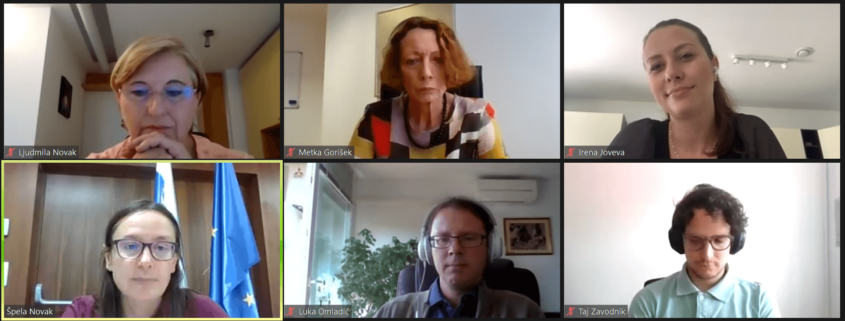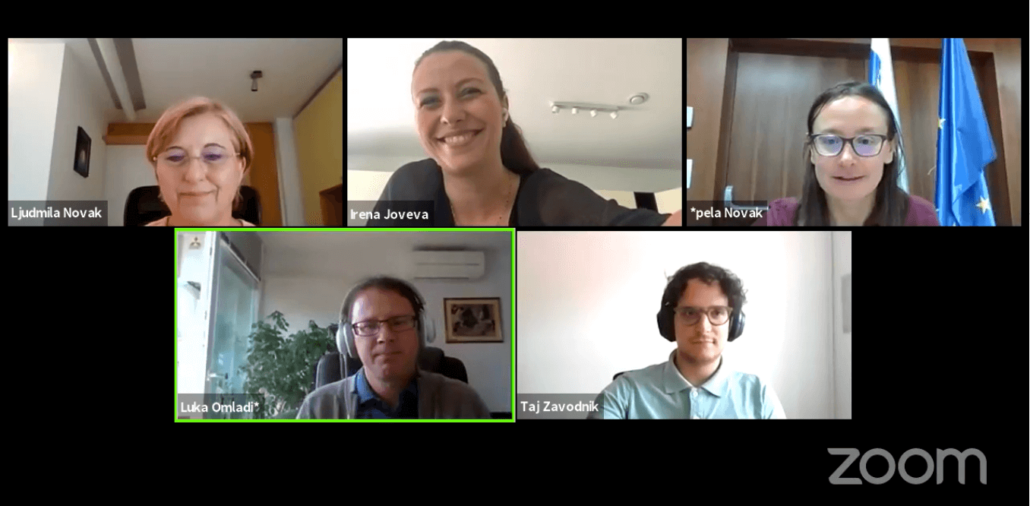On Friday, 11 September 2020, an online debate entitled “Green Deal after the pandemic” took place where MEP Irena Joveva (RE) together with MEP Ljudmila Novak (EPP), State Secretary at the Ministry of the Environment and Spatial Planning dr. Metko Gorišek, Taj Zavodnik from the Society for Sustainable Development Focus, and dr. Luka Omladič, a philosopher and environmental analyst at the Faculty of Arts at the University of Ljubljana, tried to find answers questions on what the agreement on the future of European finances and recovery from the pandemic reached in the July summit of EU member states brings from an environmental point of view.
Among other things, Members of the European Parliament point out the agreement does not make it possible to pursue the objectives of the European Green Deal. In recent months, the covid-19 pandemic and declining of economic activity and traffic developed a different apprehension of how to live differently, travel less and reduce consumption, all of which could make a vital contribution to achieving the goal of climate neutrality.
The European Parliament’s Committee on the Environment, Public Health and Food Safety (ENVI) today supported a proposal for a European Climate Act which proposes a 60% reduction in emissions by 2030 (compared to the base year 1990) and the achievement of carbon neutrality for all Member States until 2050. MEP Irena Joveva emphasised that time is ahead of us and not the other way around. “As a co-decision-maker, the European Parliament must set goals more ambitiously as each Member State often looks only at national interests and not at common / European interests and solidarity.” In her view, only the multiannual financial budget and the Just Transition Fund will not be sufficient to achieve the goal of climate neutrality; therefore, she emphasised the need for the so-called Union’s own resources. “A plastic tax has been agreed in the Council. I hope they at least extend the ETS mechanism, trade with emission coupons, at the same time, including the maritime and aviation industries, set a higher price for these coupons and then run the highest possible amount collected in the EU. Additionally, there is also a carbon import tax,” which she tries to pursue as a substitute member of the ENVI Committee.
In the end, it is up to the Member States to draw up national strategies and concrete steps to achieve the environmental objectives. The MEP Joveva expressed her concern regarding the usage of the European funds; she emphasised that, based on what she has heard so far, she is concerned that in Slovenia we will only use funds from the project to project, for short-term goals. “It is true; we will have to close TEŠ6, the construction of NEK 2 was mentioned, while we don’t talk enough about raising the share of renewable sources. Compared to other countries, the Slovenian percentage is growing too slow“ said Joveva. “The key projects will be the energy renovation of buildings, industry, renovation of the railway infrastructure, the transition to green transport, subsidies for electric vehicles, circular economy, personnel (re)training… Slovenia’s goals will have to be broader, long-term and much more imaginative to alleviate people’s social hardship, increase funding for health care, long-term care, while not reducing environmental ambitions. The price of inaction or insufficient goals in this area will be high, but not in terms of money.” These are vital things that all national decision-makers should keep in mind when formulating strategies, explained Joveva. She also pointed out that there are plenty of ideas or good practices that other countries are already implementing, from building wind power plants to a larger share of solar panels. France and Germany, for instance, have announced joint investments in the construction of batteries as well as investments in the production of hydrogen as an alternative energy source. It is necessary to set goals in the long-term strategy and pursue them if we genuinely want to live in a carbon-free environment by 2050.
Finally, she mentioned that the EU is undoubtedly a leading force in tackling climate challenges but that it is a global problem. “This ‘fight’ will depend on the result of upcoming elections in the United States, the results of which China is also waiting for.”





Leave a Reply
Want to join the discussion?Feel free to contribute!